Why a timeshare exit from Gran Caribe Real Cancun might be necessary

If you’ve ever vacationed in Cancún or scrolled through all-inclusive resort deals, you’ve probably come across the name "Gran Caribe Real." Or maybe it was "Panama Jack Cancun." Or perhaps now you recognize it as "Wyndham Alltra Cancun."
Yep, it’s the same place.
This particular resort’s identity has gone through more changes than most of us can count, and if you’re someone who signed up for a timeshare along the way, especially under the Gran Caribe Real era, you might be wondering what exactly you’re still paying for. Whether it's confusion over what brand you're dealing with, frustration over service, or concerns about ownership structure, this resort has a long and tangled history that timeshare owners absolutely need to understand.
The Long History of Gran Caribe Real Cancun
The resort was originally built in 1975 as Garza Blanca, one of Cancún’s earliest hospitality developments. Over the decades, it underwent several name changes and structural overhauls:
- 2004: Rebranded as Gran Caribe Real after a property shuffle by BD Real Resorts.
- 2006: Property split post-Hurricane Wilma into two hotels: Gran Caribe Real (north) and Royal Cancún (new build south).
- 2017: Became Panama Jack Cancun with cosmetic upgrades and branding focused on families and younger tourists.
- 2021: Rebranded again as Wyndham Alltra Cancun, joining Wyndham's upper-midscale resort category.
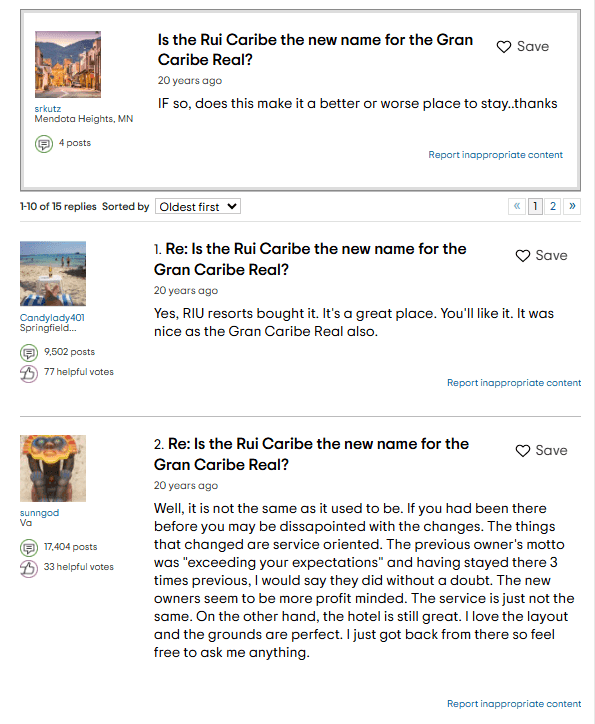


In 2003, BD Real Resorts sold an earlier version of the Gran Caribe Real property (located at kilometer 5 in Cancún’s Hotel Zone) to Riu Hotels & Resorts for $64 million USD. That original property had 550 rooms and was later rebranded by Riu as Riu Caribe.
After selling that hotel, BD Real transferred the Gran Caribe Real name to another property it owned, the former Continental Villas Plaza site at kilometer 11.5. This is the location that continued on as Gran Caribe Real (and eventually became Panama Jack Cancun, and now Wyndham Alltra Cancun).
Ownership Web: Who Actually Owns This Place?
Though the hotel has seen multiple brands slapped on its signage, the core ownership since 2017 remains with Playa Hotels & Resorts. Wyndham simply franchises the brand and handles marketing. Earlier, under BD Real Resorts, things were murkier, and more controversial.
Fernando García Zalvidea, head of BD Real Resorts, has faced allegations ranging from money laundering to illegal beachfront modifications. In one notorious 2009 incident, federal authorities shut down the hotel’s beach over an unapproved breakwater construction. Hotel employees were arrested, and the resort was publicly shamed for violating environmental laws.
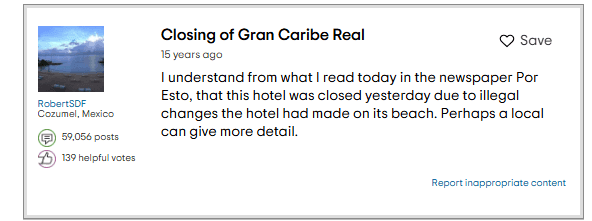
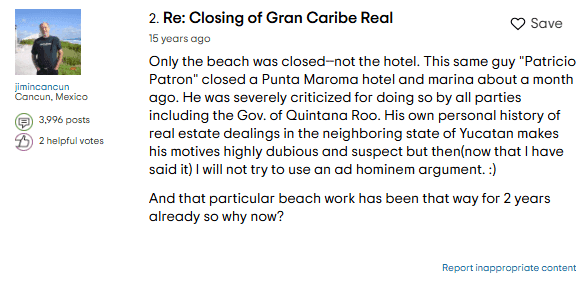
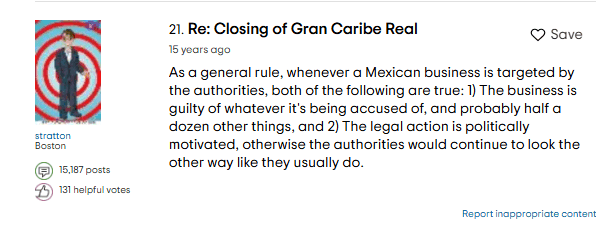
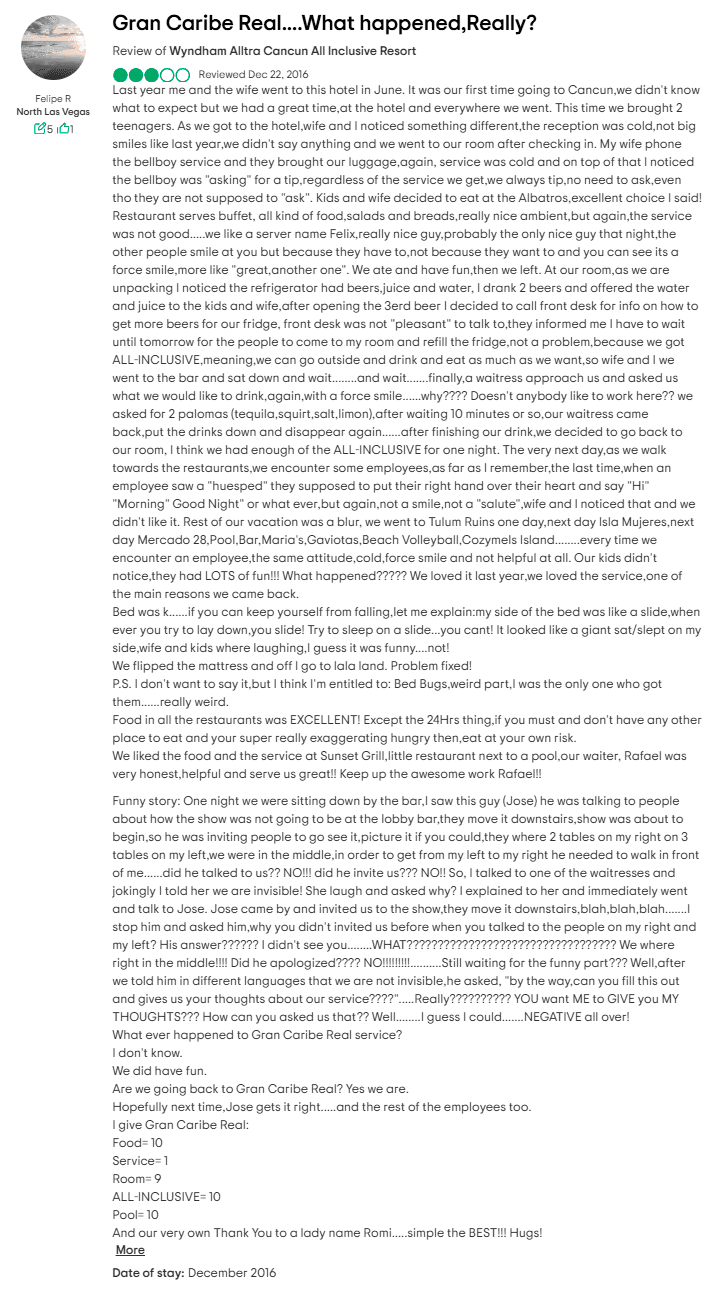
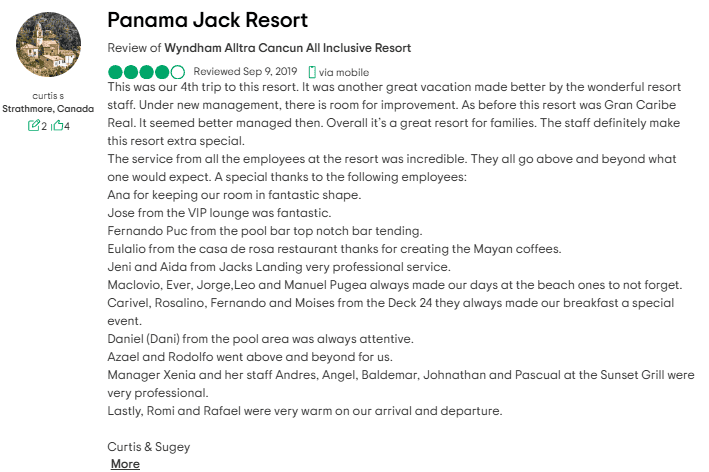
This background is important: if your timeshare originated under BD Real, it may be tied to contracts or representations from a period now surrounded by legal questions and operational inconsistencies.
Why Timeshare Owners Should Be Cautious
Over the years, Gran Caribe Real (under all its names) has seen waves of guest complaints, many of which come down to service quality and contract miscommunication:
- Tipping Expectations: Guests have reported being pressured into tipping for basic services, despite the all-inclusive promise.
- Reservation Mishaps: Especially during transitions between Panama Jack and Wyndham, some guests found their rooms downgraded or unprepared.
- Inconsistent Staff Attitudes: Staff turnover during each rebranding phase led to gaps in training and inconsistent experiences.
When you sign onto a timeshare, consistency is key. But when a resort keeps changing hands, brands, and management priorities, what you signed up for may no longer be what you’re getting.
Structural Changes and The Economic Bottom Line
After Hurricane Wilma in 2005, parts of the original property were demolished. While this was partly out of necessity, some argue the real motivation was economic: breaking up the resort allowed more rooms and reconfigurations for profit, not comfort. That theme seems to recur throughout the property's story, rebrand, refurbish, repeat.
Should You Look Into a Timeshare Exit Company?
If you’re feeling overwhelmed or unsure about your current contract, you’re not alone. Many timeshare owners locked into agreements during the Gran Caribe Real era (or even during the Panama Jack rebranding) find themselves dealing with outdated terms, unclear obligations, or unresponsive management.
Here are a few reasons why exploring a reputable timeshare exit company might be worth it:
- Lack of Transparency: Changing ownership and branding can obscure who’s responsible for what.
- Questionable Origins: Contracts signed under BD Real may be legally complicated due to past investigations.
- Diminished Value: Frequent rebrands dilute the timeshare’s resale or usage value.
- Service Decline: Guest experience reviews point to slipping standards and confusion during transition periods.
What To Look For in a Timeshare Exit Service If you decide to explore your options, be careful. The exit industry has its own bad actors. Look for firms that:
- Offer free consultations
- Have clear, written guarantees
- Use attorneys or licensed professionals
- Are transparent about costs and timelines
Conclusion
Timeshares can be a wonderful experience in theory, but they rely on the promise of stable, consistent, and quality service. The story of Gran Caribe Real Cancun suggests anything but consistency. With a history of branding confusion, legal entanglements, service issues, and structural overhauls, it may be time to evaluate whether your timeshare is still working for you.
If not, don’t be afraid to ask questions, get help, and take the steps needed to exit safely and responsibly.


